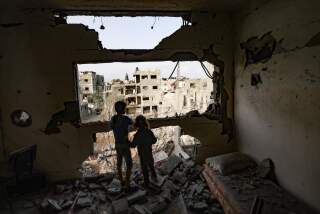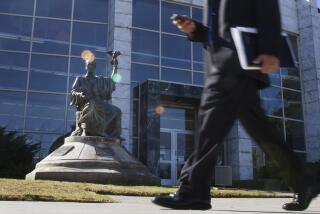Alex Odeh’s Brother Braces for Home Front Backlash
- Share via
Sami Odeh was sitting Friday in the same small room in his Orange real estate office, where he sat five years ago when the call came saying a bomb had blown up in his brother’s face.
Sami was too stunned to fall apart that morning. Nor did he flail around the office in a tirade. He simply told his client that he had to leave immediately and rushed over to the hospital in Santa Ana. Ninety minutes later, doctors told him that his brother, Alex, “didn’t make it.”
Lots of things change in five years. Then again, sometimes it seems to Sami Odeh as if nothing changes.
The issue on that October morning of 1985 was international terrorism. Alex Odeh was western director of the American-Arab Anti-Discrimination Committee. The bomb was rigged to the door of the committee’s Santa Ana office, set to go off in the face of whoever got to work first.
So Sami Odeh, now 40, is no stranger to the potential for peril for Arab-Americans. While he said he has seldom seen overt anti-Arab bias in Orange County, he now fears that the apparent imminence of war in the Persian Gulf might set efforts back again.
“I would imagine that if war breaks out, we undoubtedly will suffer heavy casualties,” Odeh said. “I have read anywhere from 50,000 to 20,000 to 30,000. But to me the death of one person is one too many. Emotion will be very high. Although you hope not, you know in your heart there will be some backlash against all Arab-Americans, regardless of whether they’re Iraqis, Palestinians, Kuwaitis or whatever, because people are going to argue that because of them, we have lost all these people, whoever ‘them’ might be.”
The frustration comes at Odeh from many directions, not the least of which is that no one was ever arrested for his brother’s death. But he’s also frustrated by the current Middle East situation, believing that President Bush has been less than forthright with the U.S. public.
“Of course, it is frustrating,” he said, “because you’re trying to educate your fellow Americans about what is really happening in the Middle East and what is the real American interest in the Middle East, and then most of the time that is contrary to what most people are believing is our interest in the Middle East.
“I’m tempted many times just to throw up my hands and say that things are not going to change, and I might as well go on and do something else. But I feel it is my duty to my country--the United States--that I continue on the path of education, the path of knowledge. The average American, once they know the facts, they really are the most fair-minded people in the world.”
It’s the U.S. refusal to work aggressively to solve the Palestinian problem that hurts its image in the Arab world, said Odeh, a Palestinian by birth who came to the United States 16 years ago.
“Sometimes you get some optimism,” he said. “You see some opening, some movement in the right direction, and then it seems like you get cold water spilled all over your face the next afternoon or morning by the President or one of the White House people saying, ‘No way, Jose.’ ”
I suggested that the Middle East problem must be difficult because of his divided loyalties. He cut me short: “No, I don’t have loyalties both places. My loyalties belong to the United States of America. Period. End of memo.”
Still, he is unhappy that President Bush has framed the Iraq situation as a crusade against Saddam Hussein.
“That is stupid,” he said. “Saddam is not Iraq. We’re talking about a country with its people. To me it is stupid in politics to make it a one-on-one contest, ‘I’m going to show the SOB,’ and conduct your foreign policy based on like or dislike of an individual. Iraqis have been around before Saddam came on the scene, and hopefully, if we don’t eliminate them, Iraqis will be around way after Saddam has gone from the scene.”
Odeh’s worst fear is that violence begets violence. “I hope the peace movement in this country will do something,” he said.
“If we wait until the body bags start coming back, we have waited too long. We must stop it before the first bag comes back. Because in the nature of hostilities, once they start, it is not up to you to stop it sometimes.”
He also hopes that if the United States goes to war, people here will remember that the enemy is Iraq and not everybody else who happens to be Arab.
More to Read
Sign up for Essential California
The most important California stories and recommendations in your inbox every morning.
You may occasionally receive promotional content from the Los Angeles Times.













